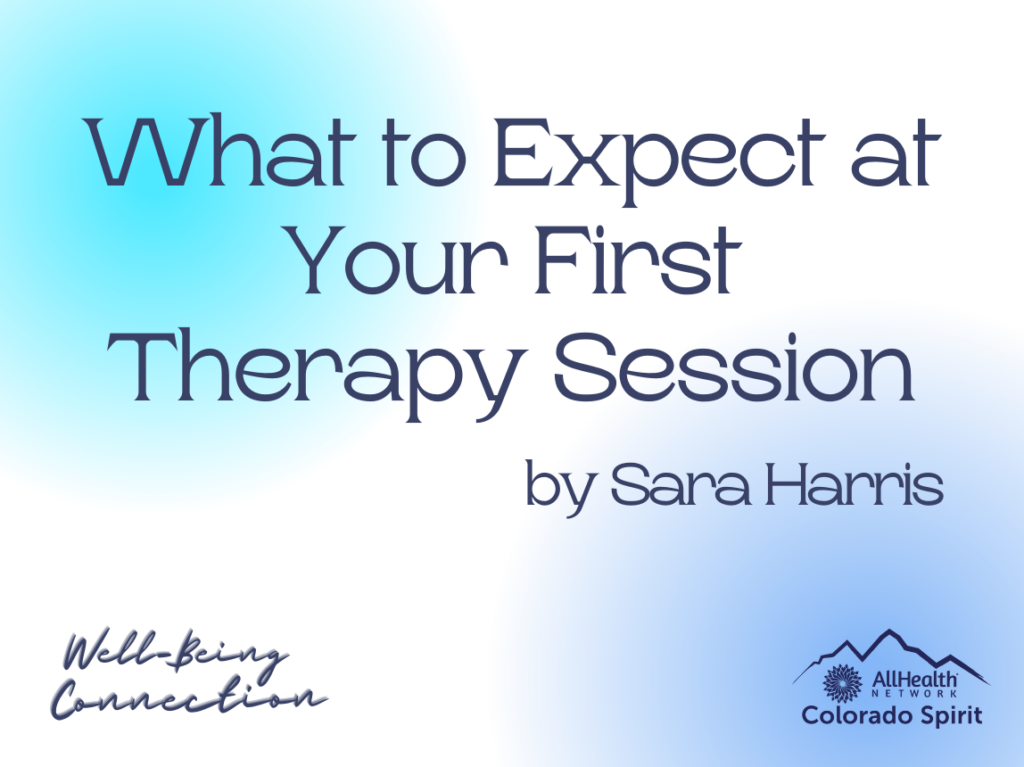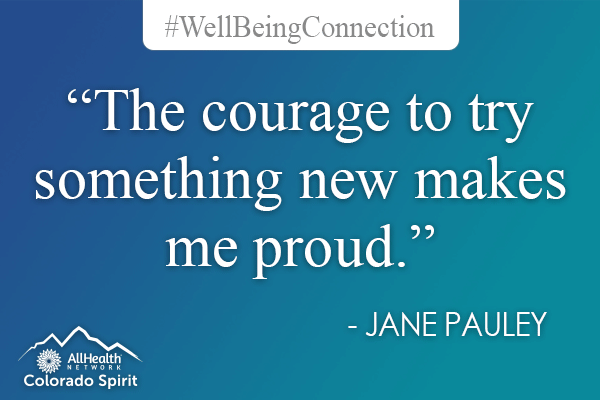Welcome to the Weekly Well-Being Connection! Each week we will share advice from our clinical experts on ways to care for your mental health and well-being throughout COVID-19. We appreciate Colorado Spirit Counselor, Sara Harris, LSW, writing this week’s content!
Last week, the Colorado Spirit Team at AllHealth Network debunked common therapy myths in our blog post . Continuing the conversation around therapy, this week our team will provide support around what your first therapy session may entail.
Trying therapy for the first time.
“The courage to try something new makes me proud” – this quote from Jane Pauley comes to mind when thinking about beginning therapy. Therapy can be an overwhelming task for many of us because mental health support is so often not taught or talked about, leaving us with no idea what to expect. However, the pandemic has created a space to collectively talk about our behavioral health, and many people have looked into trying therapy for the first time.
The courage to try something new makes me proud – Jane Pauley
Steps to finding a therapist.
After making the decision you want to try therapy, the first thing you will need to do is find a therapist. Finding the right therapist is often much easier said than done, however, the Colorado Spirit team has created a handout to help you navigate this process. Things to pay attention to when looking for a therapist may include what insurance they take, what specialties they offer, and what type of availability they have (virtual/in person). Listen to this podcast from Therapy for Black Girls or read this blog post for more suggestions.
Once you find a therapist that fits what you are searching for, you can expect a few things.
First, you will most likely complete some sort of paperwork process. This looks different across agencies and practitioners, but generally you can assume there will be questions about your insurance information, medical/family history, symptoms, and signing of different releases and agreements. If you feel uncomfortable answering any of the questions on paper, you can always wait until you are with your therapist to discuss certain items.
Your first therapy session is similar to other medical appointments.
You will most likely check in and spend some time waiting. Once you are with your therapist, the first session will operate different than future visits, as you and your therapist do introductions, get to know each other, and make a plan with how to proceed. Your therapist will explain confidentiality and let you know the situations in which confidentially would need to be broken. Therapy requires multiple visits, so it is helpful to know that the therapist may not have any instant solutions in your first session. Instead you and your therapist will work together in identifying behaviors and coping mechanisms to help you achieve your goals.
After your first therapy session, it is extremely important to check in with yourself.
To determine if you’re receiving the best care from your therapist, the National Alliance on Mental Illnesses recommends asking yourself the following questions:
- Do they challenge you?
- Do they check-in with you?
- Do they guide you to your goals?
- Do they help you learn?
- Do they show acceptance and compassion?
- Do they treat you as an equal?
If you don’t feel like it is a good fit after the first session, consider talking to your therapist about this to see if there are changes they can make or don’t hesitate to search for a different therapist. Not everyone will click with every therapist. We know that the biggest indicator for successful therapy is the relationship between you and your provider. If you don’t feel comfortable or connected with the therapist, it is completely ok to try out another therapist. Don’t be discouraged if the first, second, or third therapist isn’t the right fit. Advocate for yourself in finding a therapist that is compatible with you and your goals.
If speaking to someone would help, please reach out.
AllHealth Network provides several supports.
- To speak with someone in the Colorado Spirit Program about stress related to the pandemic, please call 720-707-6789 or visit our webpage at allhealthnetwork.or g/Colorado-Spirit
- For information about other services at AllHealth Network or to get connected with ongoing behavioral health support, please call 303-730-8858. AllHealth Network is continuing to provide service via telehealth or by phone and our Crisis Walk-in Center remains open 24/7.
If you are experiencing a mental health crisis and are in need of immediate assistance, please call the Colorado Crisis Hotline at 1-844-493-8255 (TALK) or text TALK to 38255.
Be sure to follow us on Facebook to receive information about our free groups and get notifications when we post coping tips, mindfulness suggestions, and more.
Resources
- Find the Right Therapist
- How to Prepare for Your Video Appointment
- Learn About Free Counseling and Affordable Therapy Options
- What is Telehealth and How Can it Help



